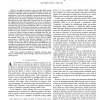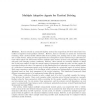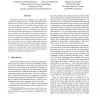123 search results - page 21 / 25 » Valued Tolerance and Decision Rules |
TCOM
2011
13 years 2 months ago
2011
—In cognitive networks, since nodes generally belong to different authorities and pursue different goals, they will not cooperate with others unless cooperation can improve their...
APIN
1998
13 years 7 months ago
1998
Abstract. Recent research in automated highway systems has ranged from low-level vision-based controllers to high-level route-guidance software. However, there is currently no syst...
COMPLEX
2009
Springer
14 years 1 months ago
2009
Springer
: Development of capital intensive systems, such as offshore oil platforms or other industrial infrastructure, generally requires a significant amount of capital investment under v...
CSFW
2007
IEEE
14 years 1 months ago
2007
IEEE
Randomized protocols for hiding private information can often be regarded as noisy channels in the informationtheoretic sense, and the inference of the concealed information can b...
IAT
2005
IEEE
14 years 29 days ago
2005
IEEE
Trust management model that we present is adapted for ubiquitous devices cooperation, rather than for classic client-supplier relationship. We use fuzzy numbers to represent trust...



